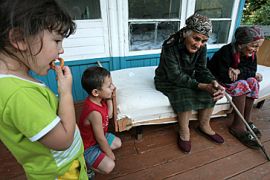Reporter’s diary: Refugee’s plight
Refugees fleeing fighting in South Ossetia take shelter in a Georgian orphanage.

 |
| There are 60 refugees housed in the orphanage, 30km north of Tbilisi |
Many people in South Ossetia have been fleeing the fighting in the capital Tskhinvali.
One orphanage has been set up near Tbilisi, the Georgian capital, to take care of the refugees.
Al Jazeera’s correspondent Alan Fisher has travelled there and sent this report.
The crying came from the hall and grew louder and louder. The reality had suddenly hit the small tired looking woman.
Now she knew what it was like to be a refugee – to wake up and realise the life you had is gone and you don’t know if you’ll ever get it back again.
There are 60 refugees from the fighting in South Ossetia now housed at an orphange 30km north of Tbilisi, the Georgian capital.
This is where they have come to escape the fighting. It’s a place they can rest, it’s certainly not a place they’d call home.
Dodo Kakhniashvili arrived here on Sunday night. She looks exhausted.
She came with six other members of her family. And left behind a nightmare.
“Right in front of me I saw two women blown to pieces. Cars were flying everywhere. We ran in a panic and we ran for our lives,” she said.
Lives stolen
Ljiana Beruashvili lived in the village of Eredvi, 7km from the South Ossetian capital of Tskhinvali.
Normally a quiet sleepy place, it suddenly became the front line of a war.
With her son Levan, she walked 12km to safety.
Speaking to me, she said: “I saw how people were being killed. Buildings were destroyed and people were dying. The dead bodies had to be left where they fell. They couldn’t be buried. It was terrible.”
She showed us around the room she’s been given here. Shaking with emotion, she told us she’s angry that the life she had had been stolen.
“It is difficult to adapt to life here. I cried all night, I could not sleep a minute,” she said.
“I kept seeing the buildings, the fires, the bombs and the dead. All the things I have here are gone. All I have is this dress I am wearing now. I think it will be impossible to adapt to this.”
Both sides in this conflcit are now caring for refugees – the victims of a war few knew was coming and who no-one knows when will end.
At least at the makeshift refugee camp, they can give food and shelter and advice and counselling. It’s hope that’s in short supply.